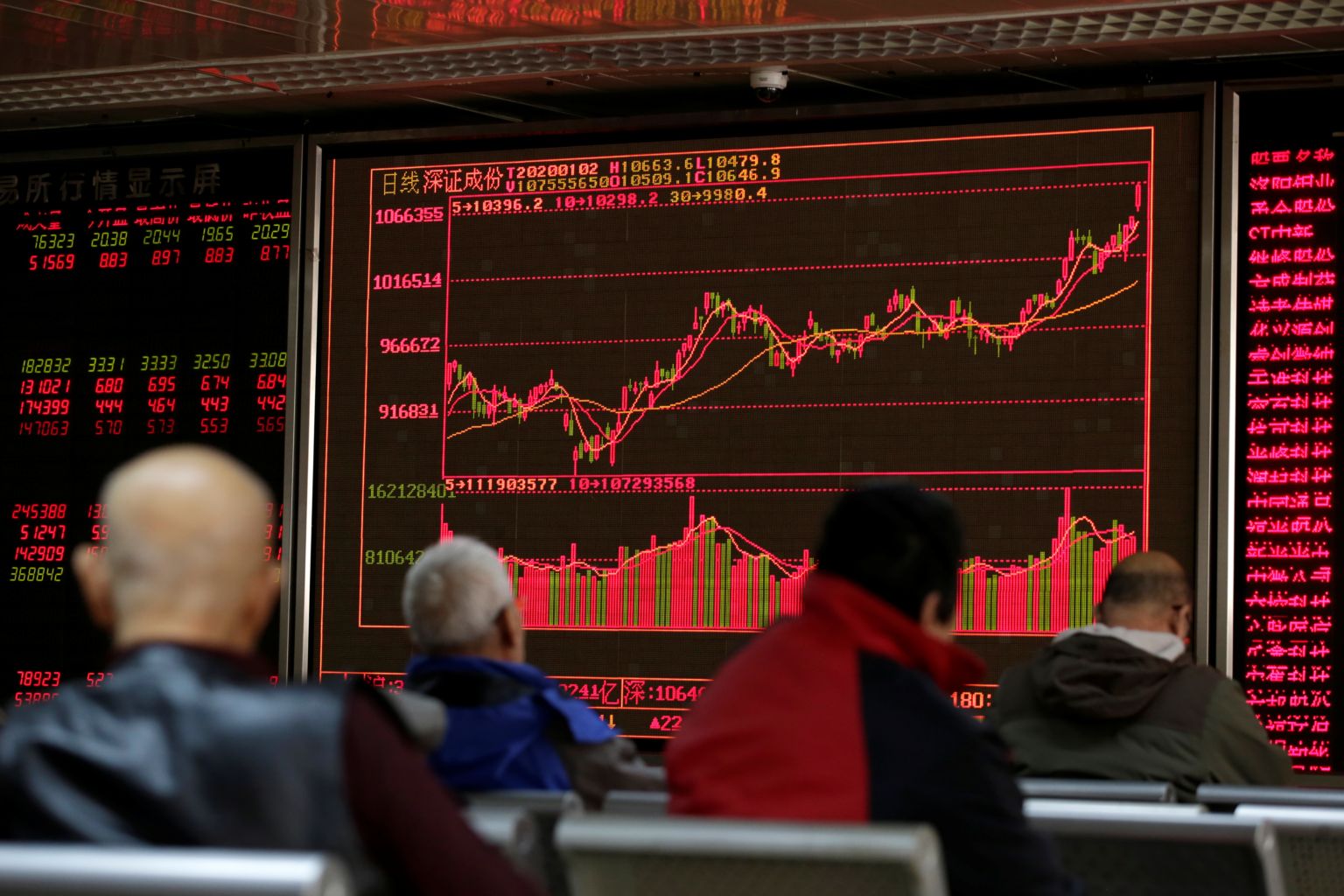China stocks plunge 8% on coronavirus crisis after markets reopen; STI closes down 1.2%
Sign up now: Get ST's newsletters delivered to your inbox

In this picture taken on Jan 2, 2020, stock information is seen at a brokerage office in Beijing. On Feb 3, the benchmark Shanghai Composite Index dived 8.73 per cent while the Shenzhen Composite Index sank 8.99 per cent.
PHOTO: REUTERS
Follow topic:
SHANGHAI (AFP, BLOOMBERG, REUTERS) - China's stock markets dived on Monday (Feb 3) with nearly 3,500 stocks falling by the daily 10 per cent limit as the country's investors got their first chance in more than a week to react to the spiralling coronavirus outbreak.
The benchmark Shanghai Composite Index closed 7.7 per cent lower, the biggest drop since the bursting of a stock market bubble in 2015, wiping US$393 billion (S$536.4 billion) off the market. The Shenzhen Composite Index, which tracks stocks on China's second exchange, plunged 8.4 per cent.
The scale of the plunge was remarkable even by the standards of China's notoriously volatile share markets, indicating deep concern over the economic impact of the epidemic, which has now killed more than people Sars in 2003.
The wipeout came even as China's central bank made its biggest cash injection to the financial system since 2004 and despite apparent regulatory moves to curb selling.
"It is really hard to trade stocks," said Li Shuwei, chairman at Beijing WanDeFu Investment Management Co. "It's impossible to predict how this disease will develop. Even the experts have no clear idea when the outbreak will end, let alone stock traders. It's too early to buy stocks right now and it's also difficult to sell as all shares are limit down. So I will just have to wait and see."
The yuan weakened by nearly 1.5 per cent to around 7.00 to the US dollar. To stem a slide in the currency, the People's Bank of China set the yuan fixing at 6.9249 per US dollar on Monday, stronger than the average estimate of traders surveyed by Bloomberg.
China commodity markets also saw a rout when they opened on Monday. Shanghai-traded commodities from palm oil to copper hit their maximum down limits.
Other Asian markets fell sharply on Monday. The benchmark Nikkei 225 index closed 1 per cent down after tumbling 1.6 per cent in early trade, while Australia's S&P/ASX 200 Index dropped 1.3 per cent
In Singapore, the Straits Times Index slid 37.42 points or 1.2 per cent to 3,116.31 by the close of trade.
South Korea's Kospi index closed flat after falling as much as 1.7 per cent. Bargain hunting lifted heavyweights, while Chinese government measures to support the economy helped recoup early losses.
Hong Kong shares closed up 0.2 per cent on bargain-buying after being battered last week.
Markets in China, the world's second-biggest economy, had closed on Jan 24 for the annual Chinese New Year holiday, but since then the viral epidemic that started in Wuhan has spread around the world.
Looking to head off a panic selling on Monday, China unveiled a slew of measures to ensure stability of its US$45 trillion financial system.
The People's Bank of China injected 1.2 trillion yuan into money markets through reverse bond repurchase agreements, the largest single-day reverse repo operation it has ever conducted. It also lowered the interest rates on reverse repurchase agreements by 10 basis points on Monday.
Bloomberg also reported that the China Securities Regulatory Commission (CSRC) told some brokerages that their proprietary traders are not allowed to be net sellers of equities this week, citing unidentified sources.
The regulator also urged some mutual fund managers not to sell shares unless they face investor redemptions, Reuters reported.
Sources also told Reuters that the CSRC had issued a verbal directive to brokerages including Citic Securities Co and China International Capital Corp to bar their clients from selling borrowed stocks on Monday.
The CSRC also said it would halt night sessions for futures trading and allow some share pledge contracts to be extended by as long as six months.
Beijing has also said it would help firms that produce vital goods resume work as soon as possible, state broadcaster CCTV reported.
Still, analysts expect Chinese onshore equity markets to remain under pressure as the number of infections is still likely to increase in the weeks ahead. China's economy is expected to take a big hit from the crisis, which has brought industrial regions grinding to a halt.
"The near-term impact on Chinese GDP growth is likely to be large," Oxford Economics said in a research note.
"Considering the affected areas account for just over 50 per cent of total Chinese output, we think this could lead China's annual GDP growth to slow to just 4 per cent in Q1," it added - down from a previous forecast of 6 per cent growth.
A total of 361 people have died in China from the coronavirus, the National Health Commission said on Monday, with infections in China jumping to over 17,000. The death toll now exceeds the 2002-03 Sars outbreak, which killed 349 people in mainland China.
The first death outside mainland China was confirmed on Sunday, when a 44-year-old man from Wuhan reportedly died in the Philippines. At least another 171 cases have been reported in more than two dozen other countries and regions.
The rout caught up with Wall Street last Friday as the Dow Jones Industrial Average fell 603.41 points, or 2.1 per cent, sealing its worst week in six months. Treasury yields fell sharply as investors priced in a greater risk of US interest rate cuts.

